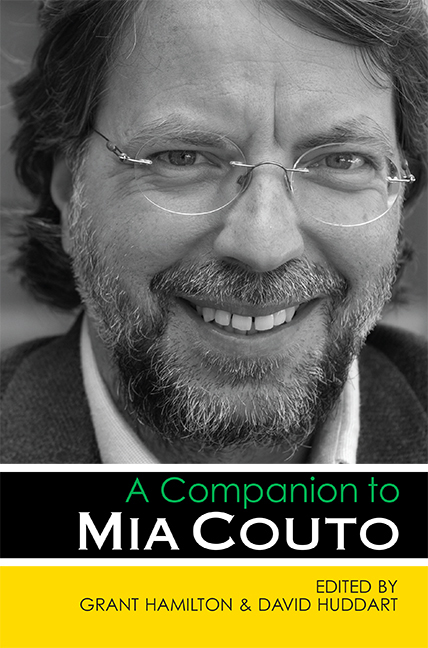Book contents
- Frontmatter
- Dedication
- Contents
- Acknowledgements
- Notes on Contributors
- Introduction
- An Interview with Mia Couto
- 1 Mia Couto in Context
- 2 Uma coisa fraterna Mia Couto & the Mutumbela Gogo Theater Group
- 3 Reading Raiz de orvalho Counterpointing Literary Genres in the Work of Mia Couto
- 4 Spaces of Magic Mia Couto’s Relational Practices
- 5 Mia Couto or the Art of Storytelling
- 6 The Multiple Worlds of Mia Couto
- 7 ‘Ask Life’ Animism & the Metaphysical Detective
- 8 Mia Couto & Translation
- 9 Jesusalém Empty Fathers & Women’s Texts
- 10 Trauma Repetition & Pure Repetition in The Tuner of Silences
- 11 Seeing Like a Crocodile Bird Mia Couto’s The Last Flight of the Flamingo
- 12 Mia Couto & Nostalgia Reading The Last Flight of the Flamingo
- 13 Mia Couto, Contexts & Issues A Bibliographic Essay
- Bibliography
- Index
An Interview with Mia Couto
Published online by Cambridge University Press: 22 May 2021
- Frontmatter
- Dedication
- Contents
- Acknowledgements
- Notes on Contributors
- Introduction
- An Interview with Mia Couto
- 1 Mia Couto in Context
- 2 Uma coisa fraterna Mia Couto & the Mutumbela Gogo Theater Group
- 3 Reading Raiz de orvalho Counterpointing Literary Genres in the Work of Mia Couto
- 4 Spaces of Magic Mia Couto’s Relational Practices
- 5 Mia Couto or the Art of Storytelling
- 6 The Multiple Worlds of Mia Couto
- 7 ‘Ask Life’ Animism & the Metaphysical Detective
- 8 Mia Couto & Translation
- 9 Jesusalém Empty Fathers & Women’s Texts
- 10 Trauma Repetition & Pure Repetition in The Tuner of Silences
- 11 Seeing Like a Crocodile Bird Mia Couto’s The Last Flight of the Flamingo
- 12 Mia Couto & Nostalgia Reading The Last Flight of the Flamingo
- 13 Mia Couto, Contexts & Issues A Bibliographic Essay
- Bibliography
- Index
Summary
The idea of World literature is currently enjoying something of a resurgence in academia. What do you think of it as a concept? Is it more helpful than other, perhaps more familiar forms of categorization, such as African literature or postcolonial literature?
As far as I am concerned, it's a step sideways rather than a step forward. Literature, like any other art form, has always been of the world. This apparently new category is a way of classifying the literature of the so-called ‘others’. But I believe that there is a process, albeit one without continuity, by which the arts from Africa, Asia and South America have been acknowledged. Works from these parts of the world are beginning to gain recognition through their quality, without the need for any other additional criterion of evaluation.
Undoubtedly, the ‘exotic’ accounts for some appeal of World literature – that is to say, the sense one has of reading about lands far away from one's own (even if those accounts are far from paradisiacal). Do you consciously look to capture or reflect this idea of the exotic by figuring specifically Mozambican elements in your fiction?
Writers always speak of ‘lands far away from one's own’. No matter how familiar an English writer may be with English reality, he eventually travels through a territory that is his own private terrain, with its mysteries and peculiarities. I write from Mozambique, and my first readers are Mozambicans. The ‘Mozambican’ components of my narratives are not motivated by any desire for exotic display or appeal.
Of course, World literature is intimately related to the art of translation. Indeed, most of your readers will have first encountered your work in translation. What are your thoughts on (the very possibility of) translation?
My experience has generally been very good. Translators do not only translate languages; they translate a voice, concretely, the voice of a given author. Their work is therefore not solely technical. It is essentially the work of a co-author. And that's how I work with translators, the assumption being that they are re-creating the book alongside me. The truth is that there is a poetic element in my prose that would not allow it to be done in any other way.
- Type
- Chapter
- Information
- A Companion to Mia Couto , pp. 14 - 16Publisher: Boydell & BrewerPrint publication year: 2016



